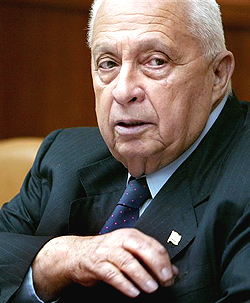Israeli PM Disputes Karpinski Statement
• But there's nothing to prohibit Israeli citizens from working as private contractors in Iraq, Pentagon says.
By Leon Worden Wednesday, July 7, 2004
*MEDIA—MANDATORY CREDIT: The Signal newspaper of Santa Clarita, Calif.
Signal City Editor
sraeli Prime Minister Ariel Sharon's office emphatically denied Tuesday that America's former top jailer in Iraq could have met an Israeli interrogator there.
I
"Israel does not have interrogators in Iraq," a Sharon spokesman in Jerusalem told The Signal.
Brig. Gen. Janis Karpinski, head of detention operations throughout Iraq last fall, said in a two-hour Signal interview last week that she met an Israeli interrogator while visiting a secret facility for questioning high-value detainees.
Karpinski reiterated the comment in a short interview with the British Broadcasting Corp. that aired over the weekend. Reports about The Signal and BBC interviews have been circulating widely abroad.
Sharon's spokesman said the prime minister "flatly denied the report." He refused to elaborate on whether the Israeli government has any employees at all in Iraq.
Israel is not a member of the U.S.-led coalition, and an Israeli presence in Iraq could soften Arab support.
Karpinski elaborated Tuesday on her encounter with the interrogator, telling The Signal that she met him at a facility that "was used principally for interrogating higher-value detainees. The location is classified, and as far as I know it did not have a specific name."
She said she "asked him if he was an Iraqi or a Kuwaiti because he was obviously from the Middle East. He said, 'Neither. I am an Israeli.'"
Asked whether he could have been a naturalized U.S. citizen, Karpinski said no.
"I know the differences between naturalized U.S. citizens and others," said Karpinski, who speaks Arabic and worked for several years in the Middle East following the 1991 Persian Gulf War.
A Pentagon spokesman, asked if an Israeli citizen could have been questioning prisoners for the U.S. government, said it's possible — and if the interrogator were a private civilian contractor, the Pentagon wouldn't necessarily know his nationality.
"We don't know the nationalities of every contractor," said the spokesman, who asked not to be named. "They'd have to speak Arabic, so there's a good chance you'd have to contract some persons not of U.S. nationality."
The Army Intelligence and Security Command (INSCOM) contracted with Arlington, Va.-based CACI International Inc. to augment its contingent of interrogators in Iraq. CACI officials could not be reached Tuesday and have not discussed their hiring practices publicly.
"There is nothing wrong with being from Israel," the Pentagon spokesman said. "I don't know that we have a specific prohibition against anybody of a certain nationality or from a certain country (working) under a contract. That would probably be illegal."
But Army policy generally precludes the use of civilian contractors, foreign or domestic, in the interrogation process.
In a Dec. 26, 2000, memo, Assistant Army Secretary Patrick T. Henry instructed that intelligence gathering is "an inherently governmental function barred from private sector performance."
Interrogations often yield information that can lead to a battlefield response, and civilians could pose a risk to national security, he determined.
"Private contractors may be acquired by foreign interests, acquire and maintain interests in foreign countries, and provide foreign support to foreign customers," he wrote.
In his investigation of Karpinski's military police brigade, Maj. Gen. Antonio Taguba found that, "in general, U.S. civilian contract personnel — Titan Corporation, CACI, etc. — third country nationals, and local contractors do not appear to be properly supervised within the detention facility at Abu Ghraib. During our on-site inspection, they wandered about with too much unsupervised free access in the detainee area."
Titan translators and CACI interrogators at Abu Ghraib were under the command of the 205th Military Intelligence Brigade, which is the subject of an ongoing Army inquiry.
One contractor Taguba identified as "either directly or indirectly responsible" for the prisoner abuse was a Titan translator from Canyon Country with the ironic name of John B. Israel.
Public records show he was born in Iraq in 1955. Government officials have been unable to affirm his nationality, and INSCOM spokeswoman Deborah Y. Parker said Tuesday that her agency "is not authorized to release information on individuals alleged to be involved in the Abu Ghraib investigation."
Titan has said John Israel is an American. The New York Times, which obtained the translator's still-classifed statement to Taguba, identified him as an Iraqi-American Christian. A spokesman at the Israeli consulate in Los Angeles said last month that he is not a citizen of Israel. His attorney has shunned all questions, including inquiries about his citizenship.
©2004, THE SIGNAL · ALL RIGHTS RESERVED.
